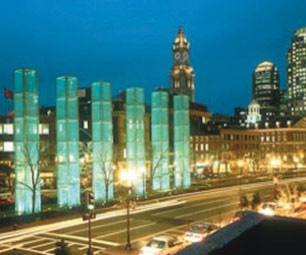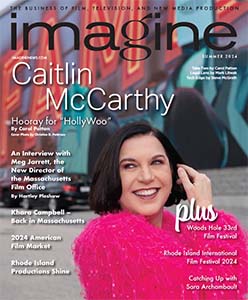by Roger Lyons
It began as a simple assignment—to produce one-minute profiles of ordinary people doing extraordinary things. One turned out to be an inspiring story, worthy of a feature-length film. The subject was Holocaust survivor Steve Ross, founder of the New England Holocaust Memorial. His story was beyond remarkable. Producer Roger Lyons arranged to meet him at the Memorial in downtown Boston.
Steve was articulate and compelling, explaining why he had been so determined to build a memorial. He said he wanted to create a place where he and other survivors and descendants could pay their respects to the family members who had died in the Holocaust.

Dachau Liberation. Steve is seen left wearing stripes. Photo courtesy the United States Holocaust Museum.
STEVE ROSS: GIVING BACK TO AMERICA was born. My intent was not to make a “typical Holocaust film” but to tell the story of someone who had not survived, but triumphed over adversity, evil and hate…and dedicated his life in America to helping others do the same.
Steve’s journey began in Lodz, Poland. As a 9-year-old child, his family hid him from the Nazis at a farm. But the Nazis found the Jewish child, nee Shmulek Rozenthal, hiding in the woods.
He was sent to ten concentration camps over five torturous years, where he endured savage beatings and horrific medical experiments. Selected many times for extermination, he miraculously eluded death—once by clinging to the underside of a moving train leaving Auschwitz and another time hiding in the waste of an outhouse.
Finally liberated from the hell of Dachau by American troops, one soldier showed Steve particular kindness—giving him food and embracing the sickly youth. This GI also gave him a small American flag, which he still carries with him today. Ross spent much of the next seven decades trying to find that “angel” who freed him and showed him that human love and compassion still existed in the world.
Steve’s life after the war is the focus of this story. Arriving in America as an uneducated orphan who spoke no English, he eventually became a licensed psychologist—the ultimate at-risk child working with at-risk youth. He worked with inner city kids, steering them from the street to school. He touched countless lives and inspired people with his example of resilience.
Steve made the New England Holocaust Memorial a reality, with the help of then-Boston Mayor Ray Flynn. Today, the Memorial stands in downtown Boston, where visitors are engaged and enlightened by the striking glass towers and rising steam, paying homage to the millions whose lives were taken in the camps. Steve was determined to build this space as a way to tell present and future generations that the Holocaust was both real and unimaginable.
Over the last thirteen plus years, my crew and I have documented many compelling events in Steve’s life. We’ve captured his lectures at Boston schools, where inner city kids hung on his every word—in awe of what he had gone through compared to their lives. We recorded two Holocaust Remembrance events at Faneuil Hall. At one event, Steve reads a Yiddish poem he learned in the camps. At the second one, he recounts his life in captivity. Following each event,we go with Steve from the hall to the Memorial, where survivors and descendants alike pay their respects to the family members who had died in the Holocaust.
We’ve recorded events where dozens of people were sworn in as new citizens. Steve spoke to them about his love for America and his life here. At the John F. Kennedy Library event, Steve meets with a new citizen from his native Poland and speaks perfect Polish, having not spoken the language in decades.
Throughout the film, we witness Steve’s search for that American soldier who made such an impact on his life. Remarkably, the soldier’s granddaughter discovers a TV show on You Tube, featuring Steve’s story and his search for his “angel.” The film climaxes with an emotional reunion at Boston’s State House on Veteran’s Day.
After more than a decade of gathering material, we have arrived at the stage where we need finishing funds for edit and post to complete the film. My hope is to finish the film soon and share Steve’s story with young people and adults all over the world.
Ideally, Steve’s story warrants a theatrical release and is a good candidate for European and Israeli foreign sales and distribution, American Public Television, History Channel, VOD and DVD. It is sure to be a favorite on the film festival circuit, especially Jewish Film Festivals, and has a multitude of web and school distribution possibilities.
Steve’s story is one of perseverance and hope. It’s a lesson in never giving up, and I won’t give up on getting this film completed in order to honor Steve for all the people he’s helped in his adopted country.
Producer Roger Lyons is seeking finishing funds for STEVE ROSS: GIVING BACK TO AMERICA along with foreign sales/ distribution and domestic distribution opportunities.-PUB
The production can be contacted through www.steverossfilm.org.








